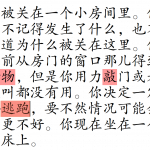 Varying your diet of Chinese reading and listening practice is often considered good, indeed necessary, for your learning, but this could be wrong. In some cases, variation makes things too difficult, and then narrow reading and listening is a better option!
Varying your diet of Chinese reading and listening practice is often considered good, indeed necessary, for your learning, but this could be wrong. In some cases, variation makes things too difficult, and then narrow reading and listening is a better option!
In this article, I will discuss a fundamental problem with how students of Chinese practise reading and listening ability. I will also explain what narrow reading and listening is, and how this approach can help you bridge the gap from textbooks to real Chinese.
I will start by discussing beginner reading and listening but will then switch to intermediate and above.
Tune in to the Hacking Chinese Podcast to listen to the related episode:
Available on Apple Podcasts, Google Podcasts, Overcast, Spotify, YouTube and many other platforms!
Build vocabulary by associating form with meaning repeatedly over time
When you first start learning a language like Chinese, it’s best to rely on reading and listening content tailored to beginners. The reason is simple: if your native language is English or any other Indo-European language, there’s almost no overlap in vocabulary between your language and Chinese. Unless something is created specifically for beginners, it’s unlikely that you will understand it without suffering a dictionary overdose.
We learn new words by associating form (written or spoken) with meaning repeatedly, preferably spread out over time and in meaningful contexts. There are many ways to achieve this, which can be mixed and modified according to preference. Some people think flashcards are great for learning unfamiliar vocabulary, others think that reading and listening more is better, yet others (yours truly included) think that a combination of the two provides the best solution.
A combination of extensive reading and flashcards works best
 Regardless of what approach you choose, repeated exposure over time is necessary to grow your vocabulary. Simply studying a word a few times will not be enough, and seeing it used in your textbook a few times won’t suffice either.
Regardless of what approach you choose, repeated exposure over time is necessary to grow your vocabulary. Simply studying a word a few times will not be enough, and seeing it used in your textbook a few times won’t suffice either.
By using flashcards, you make sure that you do encounter the words over and over, but depending on what your flashcards look like, you are also missing contextual information, because knowing what something means on a flashcard is not the same as interpreting its meaning in a real-world message.
Still, flashcards rely on well-researched principles of learning and can be great if used correctly (see my Skritter review for a discussion why this is the case but note that this is true for any flashcard app).
By relying on extensive reading and listening, you will get exposed to the vocabulary in different situations and will thereby acquire meaning and usage more naturally. On the other hand, unless you read a lot, you risk not encountering the words you’re learning often enough to make them stick. If the texts you read are hard, you will cover less text and the time between exposures to specific words grows even longer.
I’ve published several articles with suggestions for what to read:
- The best Chinese reading practice for beginners
- The 10 best free Chinese reading resources for beginner, intermediate and advanced learners
…and what to listen to:
- Beginner Chinese listening practice: What to listen to and how
- The 10 best free Chinese listening resources for beginner, intermediate and advanced learners
Because flashcards are highly efficient and the problem of finding reading and listening materials is not trivial, I think a combination of flashcards and extensive reading and listening works best, especially on lower levels.
Bridging the gap to real Chinese reading and listening
There’s a huge gap between the Chinese you encounter within the safe confines of your classroom or textbook and what real Chinese people actually say and write in the real world. There’s nothing strange or unusual with this, but it can be disorientating and disheartening if you think you’re doing well in course but fail to understand what seems like basic communication once you interact with native speakers. This can be extra painful if you’ve followed a trail blazed by your teacher and textbook authors, something I wrote more about in Seeing through the illusion of advanced Chinese learning.
In that article, I argued that you need to develop a broad proficiency, rather than a narrow ability focusing on a small sliver of the language. Diversifying your reading and listening is necessary and has many additional benefits. You will get exposed to many ways of speaking and writing, different vocabulary use, cultural references, pronunciation variation, genre and style differences and so on.
To understand the Chinese used among native speakers, you need all of that, but the problem is that unless your Chinese is not already advanced, this diversity can also work against you. The are tens of thousands of words to learn, innumerable ways of saying almost the same things, and so much culture to absorb that you risk drowning in it.
Divnersity is great, but it also makes reading and listening harder. Hard means slow. Slow means that you’re not covering enough content, which in turn means that you’re not getting exposed to any given piece of vocabulary or grammar enough to acquire it without relying heavily on flashcards and the like.
For a more in-depth discussion about authentic reading and listening materials, please check: Are authentic texts good for learning Chinese or is graded content better?
Are authentic texts good for learning Chinese or is graded content better?
Enter: Narrow reading and narrow listening
This is where narrow reading and narrow listening come in to save the day. They offer a way to read and listen extensively without drowning in difficult language and while making sure you do encounter words and grammar often enough to acquire them incidentally (i.e. as part of the natural reading and listening process).
Narrow here means that you’re limiting your input in some way. Here are a few examples:
 Listen to the same person speaking Chinese – You might have noticed that it’s harder to speak with strangers in Chinese than it is to speak with your Chinese friend. This is because you’ve grown used to the way your friend speaks, but not how everybody else speaks. We all use different words, prefer certain expressions over others, and pronounce all these things differently, so by limiting your input to one person, you can lower the difficult significantly. For more about how people are different, check Chinese listening strategies: Diversify your listening practice.
Listen to the same person speaking Chinese – You might have noticed that it’s harder to speak with strangers in Chinese than it is to speak with your Chinese friend. This is because you’ve grown used to the way your friend speaks, but not how everybody else speaks. We all use different words, prefer certain expressions over others, and pronounce all these things differently, so by limiting your input to one person, you can lower the difficult significantly. For more about how people are different, check Chinese listening strategies: Diversify your listening practice. Read about the same topic several times – Chinese textbooks are usually structured around clearly defined topics, so one chapter is about sports, the next is about food and the third is about going to the airport. This ensures that each chapter contains a large amount of new vocabulary, making all standard textbooks good examples of intensive reading (that’s the opposite of extensive reading, which I recommended earlier). A better approach would be to read about the same topic many times, but from slightly different angles.
Read about the same topic several times – Chinese textbooks are usually structured around clearly defined topics, so one chapter is about sports, the next is about food and the third is about going to the airport. This ensures that each chapter contains a large amount of new vocabulary, making all standard textbooks good examples of intensive reading (that’s the opposite of extensive reading, which I recommended earlier). A better approach would be to read about the same topic many times, but from slightly different angles. Focus on long-form content even on lower levels – Many people think that reading long texts are harder than reading short texts, but in fact, the opposite is true! Anyone who has tried reading a book in Chinese (graded readers count, but not textbooks) will know that the first few pages are the hardest, and then it gets easier after that (see e.g., Yang 2001). This is only natural, considering that you need to get into the setting, learn what the characters are called, and learn some key vocabulary related to the story. Focusing on long-form content is important!
Focus on long-form content even on lower levels – Many people think that reading long texts are harder than reading short texts, but in fact, the opposite is true! Anyone who has tried reading a book in Chinese (graded readers count, but not textbooks) will know that the first few pages are the hardest, and then it gets easier after that (see e.g., Yang 2001). This is only natural, considering that you need to get into the setting, learn what the characters are called, and learn some key vocabulary related to the story. Focusing on long-form content is important!
Before we go on, I want to say that the concept of narrow reading and listening was developed by Stephen Krashen (1981, 1996), and then further discussed by many others (see references and further reading at the bottom of this article), but that what I present here is my own take.
Two distinct kinds of narrow
I should clarify that this type of narrowness might seem superficially related to the narrowness I talked about in the article about the illusion of advanced learning linked to above, but that these are in fact quite different. When it comes to narrow reading and listening, we’re talking about limiting the topic and subject matter to make sure that vocabulary and grammar appear often enough to be acquired.
In the article about illusory advanced learning, I complained about focusing too much on texts where the language itself is limited to only contain things covered in previous textbook chapters in the same series. This is clearly not the same thing.
The benefits of narrow reading and narrow listening in Chinese
So, let’s list a few reasons this approach is useful, although I have mentioned some of them already:
 It lowers difficulty – As mentioned above, by restricting your input, you make it easier to understand and you can cover more content. Learning a language should not feel like you’re deciphering a secret code, it should be as enjoyable as reading an interesting story. For more ways of lowering difficult, please check: 8 great ways to scaffold your Chinese learning.
It lowers difficulty – As mentioned above, by restricting your input, you make it easier to understand and you can cover more content. Learning a language should not feel like you’re deciphering a secret code, it should be as enjoyable as reading an interesting story. For more ways of lowering difficult, please check: 8 great ways to scaffold your Chinese learning. It makes flow possible – If you always jump into new material, it will be difficult to create flow in your listening and reading. The more familiar you become with the topic/person/genre, the more enjoyable it will be to keep going. This is the same as focusing on long-form content over bite-sized chunks.
It makes flow possible – If you always jump into new material, it will be difficult to create flow in your listening and reading. The more familiar you become with the topic/person/genre, the more enjoyable it will be to keep going. This is the same as focusing on long-form content over bite-sized chunks. It’s motivating – Feeling that you gradually understand more and need to spend less energy to do so is very motivating. You can feel how your Chinese improves! It’s also great fun to be able to enjoy a story or interesting text, rather than always having to fight your way through a jungle of unknown words. Make sure you have fun learning Chinese or else…
It’s motivating – Feeling that you gradually understand more and need to spend less energy to do so is very motivating. You can feel how your Chinese improves! It’s also great fun to be able to enjoy a story or interesting text, rather than always having to fight your way through a jungle of unknown words. Make sure you have fun learning Chinese or else…- It allows you to focus on interesting topics – While it’s possible to find interesting reading and listening materials for beginners, the likelihood is that most things you are genuinely interested in, such as things you enjoy listening to or reading about in your native language, require more advanced language. By choosing one of these topics for your narrow reading or listening, it becomes possible to use it for language learning.
 It integrates learning and reviewing – This is a fundamental aspect of narrow listening and reading, namely that by limiting the input in some way, you make sure that you are exposed to vocabulary and grammar enough to acquire it. Constantly jumping from topic to topic makes sure you forget most of what you’ve learnt. Reading is a lot like spaced repetition, only better.
It integrates learning and reviewing – This is a fundamental aspect of narrow listening and reading, namely that by limiting the input in some way, you make sure that you are exposed to vocabulary and grammar enough to acquire it. Constantly jumping from topic to topic makes sure you forget most of what you’ve learnt. Reading is a lot like spaced repetition, only better.
Problems with narrow listening and reading
So, are there any disadvantages with using this method? Not really. unless done to extremes.
I stand by my earlier advice that diversity is great, but what that means differ by proficiency level. As a beginner, you’re faced with more diversity than you can handle. As an intermediate learner, you need more diversity, but if you start using authentic materials you will find them extremely difficult, and progress will be slow. The only way to approach this type of content while still doing it extensively is to use narrow reading and listening.
At an advanced level, I think there’s greater need for diversity, but there’s plenty of room for diversity while still narrowing your focus. Reading the same author doesn’t mean that all articles are the same, and different approaches to the same news event will be quite different depending on what you read. If nothing else, you will of course change focus to something else later, and if you’re worried about diversity, make sure you pick something well outside your comfort zone.
Conclusion: Narrow reading and listening are great for learning Chinese
In short, sacrificing some diversity when reading and listening to lower difficulty and increase enjoyment is well worth it. Not all the time and not in all cases, but often enough that all students should have this method in their toolboxes.
References and further reading
Bryan, S. (2011). Extensive Reading, Narrow Reading and second language learners: implications for libraries. The Australian Library Journal, 60(2), 113-122.
Cho, K. S., Ahn, K. O., & Krashen, S. (2005). The effects of narrow reading of authentic texts on interest and reading ability in English as a foreign language. Reading Improvement, 42(1), 58-65.
Krashen, S. D. (1996). The case for narrow listening. System, 24(1), 97-100.
Krashen, S. D. (1981). The case for narrow reading. TESOL Newsletter, 15(6), 23.
Schmitt, N., & Carter, R. (2000). The lexical advantages of narrow reading for second language learners. Tesol Journal, 9(1), 4-9.
Yang, A. (2001). Reading and the non-academic learner: A mystery solved. System, 29(4), 451-466.
Editor’s note: This article, originally published in 2017, was rewritten from scratch and massively updated in June, 2023.

Tips and tricks for how to learn Chinese directly in your inbox
I've been learning and teaching Chinese for more than a decade. My goal is to help you find a way of learning that works for you. Sign up to my newsletter for a 7-day crash course in how to learn, as well as weekly ideas for how to improve your learning!
3 comments
“Don’t switch genre after each short story or novel you read, stay with the same genre and foes on that.”
Foes should be focus.
THanks for reporting; I have fixed the typo now! 🙂
Revisiting this article as it was linked from your latest. I find watching Chinese game shows like 非诚勿扰 and 中国好歌曲 to be a very effective method of narrow listening. They often unfold as a series of similar situations articulated slightly differently–that singer’s rhythm was good, that singer’s melody was bad, etc. It’s also entertaining.